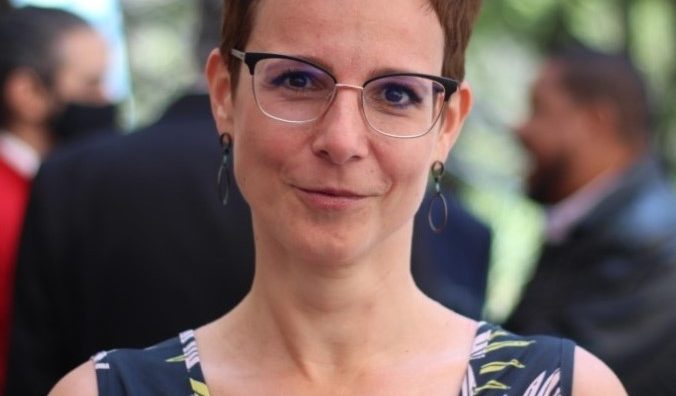
Today's science knows no national borders. The most important thing is experience, knowledge, and a passion for sharing it. Having joined Mykolas Romeris University (MRU) just a few months ago as a chief researcher at the Public Security Academy, Hungarian-born Prof. Dr. Tímea Drinóczi has already represented the university on the international stage at the prestigious conference in University of Oxford ( "Women, Gender, and Constitutionalism in Central and Eastern Europe"). There, she presented her research on the intersections of gender equality and constitutional processes in Central and Eastern Europe.
"Speaking at Oxford, I emphasized that the experiences of women and minorities in constitutional processes are not a side issue – they are a litmus test for democracy," says Prof. Dr. T. Drinóczi.
Having joined the MRU academic community this academic year, she brought with her a broad network of international research accumulated in Europe and Latin America. Her work combines law, linguistics, and social sciences, and her research is not limited to court practices – the scholar examines the deep connections between democracy, constitutionalism, and social change.
The anatomy of democracy: when lawmaking becomes a constitutional problem
Prof. Dr. Tímea Drinóczi's newest research focuses on issues of lawmaking and constitutional resistance and resilience in both Europe and Latin America. She has participated in numerous international projects and co-authored several books.
Together with Hungarian scholar Viktor Kazai, she is editing a publication that is planned to be released by the prestigious publishing house Bloomsbury Hart Publishing. The publication will present the views on the legislative process of more than 20 European countries' practices and institutions, including the European Court of Human Rights, the Venice Commission, and the OSCE ODIHR. One of the chapters of this publication is being written by MRU Law school constitutional law expert Dr. Jolita Miliuvienė.
"This is our first collaboration with dr. J. Miliuvienė and, I believe, an excellent start to a further professional partnership," says Prof. Dr. Tímea Drinóczi.
At the same time, she is involved in another project together with colleagues from Brazil, Chile, Hungary, analyzing abusive legislative practices in Latin America. Both of these projects are being developed within the international ICCAL network (Max Planck Institute, Germany), where the researcher is investigating how the oversight of legislative processes contributes to constitutional stability.
While in Latin America, Prof. Dr. Tímea Drinóczi has also established a collaboration with Brazilianscholar Dr. Victor Marcel Pinheiro (IDP, Brazília). Together, they are preparing a new Bloomsbury Hart publication on the theory, practice, and challenges of the parliamentary law-making process in Latin America. The book will present the experiences of thirteen jurisdictions and regional perspectives that are often overlooked in comparative studies.
"The legislative process is not just a technical procedure. It reflects the constitutional culture of a state—its ability to listen, negotiate, and respect balance," says Prof. Dr. Tímea Drinóczi.
When democracy and constitutionalism collapse together
Together with Polish constitutionalist Agnieszka Bień-Kacała, Prof. Dr. T. Drinoczi coined the term "illiberal constitutionalism" to describe the processes of democratic decline in Hungary and Poland.
Their joint research has been published in two Routledge books (2021, 2022) and will soon be featured in the Oxford Handbook of Comparative Constitutional Law (2nd edition).
"The decline of democracy not only weakens institutions, but also undermines the very essence of constitutionalism—the collapse of these two phenomena is mutual," explains the researcher.
She also analyzes these issues in international projects exploring the relationship between constitutional identity and illiberalism in various countries, from South Africa to India and Brazil. Together with her Brazilian colleague Emilio Meyer (UFMG, Belo Horizonte), she organized a symposium for the International Journal of Constitutional Law.
Legislative language and interdisciplinary research
Prof. Dr. T. Drinoczi's work also stands out for its interdisciplinary approach, combining law and linguistics.
The book Language for Legislation and Legislation through Language (Routledge, 2026), edited together with Giulia A. Pennisi and Helen Xanthaki, is the first interdisciplinary collection exploring how linguistics can help create clearer, more transparent legislation (link).
"Legislative drafting is not just a legal or technical task. It is a communicative act that determines how citizens understand and accept the law," emphasizes Prof. Dr. Tímea Drinóczi.
Her work also covers socially relevant topics, such as research on far-right discourse and its impact on the protection of women's and LGBTQ+ rights in Latin America and Europe. This direction has already borne fruit – an educational publication in Portuguese has been prepared (link) and a new book is also in progress: an edited volume on the topic that will be published by Routledge.
Teaching as co-creation
With teaching experience in Brazil and Kenya, Prof. Dr. Tímea Drinóczi brings an active, dialogue-based teaching methodology to MRU.
"My goal is to educate independent, critically thinking students. Instead of traditional exams, students prepare short research papers based on class discussions and reflections," she says.
She already contributed to the 13th International Conference for Young Researchers, "Social Transformations in Contemporary Society" (STICS 2025), organized by the MRU Doctoral Society, which provides a space for exploring social change and academic community.
MRU's value – international connections and new directions for cooperation
In a short period of time, new entries have already appeared in the MRU publication list under the name of Prof. Dr. Tímea Drinóczi – in publications by Routledge, Oxford University Press, Springer, Bloomsbury Hart, and Walter de Gruyter.
Prof. Dr. Tímea Drinóczi's activities show that MRU is becoming an increasingly prominent participant in international constitutional law networks. Her arrival has opened up new avenues of cooperation for the university with universities in Oxford, Brazil, as well as new opportunities for students and young researchers.
"MRU has great potential to bring together the experiences of different countries and promote academic dialogue between disciplines. I believe that the ideas born here can have a global impact," says the researcher.
Text prepared by Laura Stankūnė, Communications Manager at the Science and Innovation Center